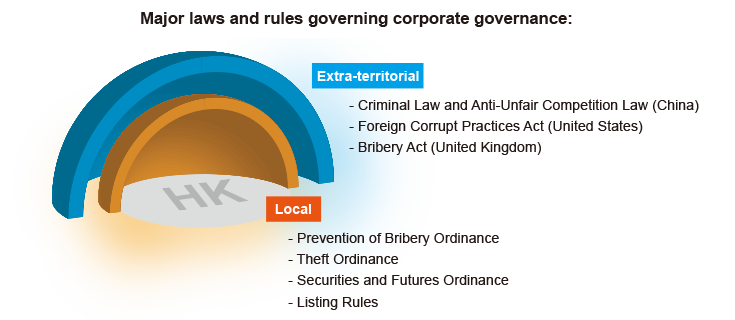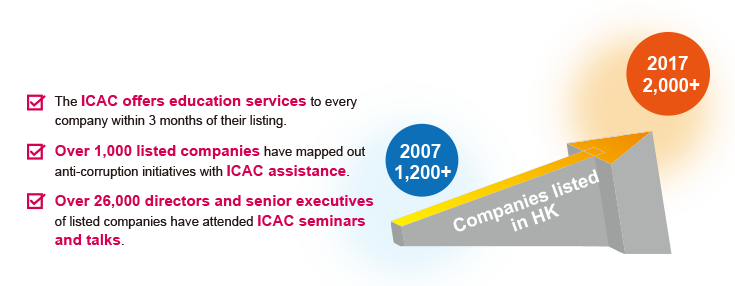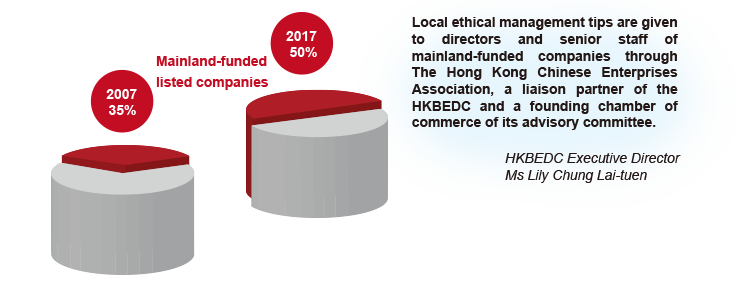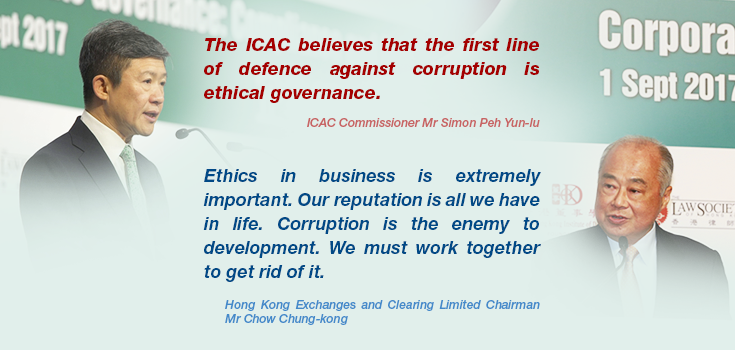The rule of law at the heart of anti-corruption success
Hong Kong enjoys worldwide acclaim as one of the most corruption-free places, with a sound anti-graft system and a culture of probity entrenched in the community. Every so often, our holistic strategy combining law enforcement, systemic prevention and community education is cited as an anti-corruption model. What lies at the heart of its success is the ICAC’s and the Hong Kong Special Administrative Region (HKSAR) Government’s undaunted determination in upholding the rule of law.
Our anti-bribery law, which is modern, clear and just, covers both the government and the private sector. More importantly, it is enforced in a fair and impartial manner, without any political consideration. Regardless of the background, status and position of persons or organisations involved, the corrupt will be brought to justice for open and fair trials before the court.
Every now and then there were concerns over the city’s judicial independence and rule of law. Keen concerns they might be, still they are unjustified ones fuelled by misinformation and misunderstanding.
The HKSAR Government is committed to upholding the core values of Hong Kong, including judicial independence, the independent status of the ICAC and the rule of law which are all well affirmed by the Basic Law. It is our constitutional responsibility to safeguard the cornerstone of the clean, fair and open society we enjoy today.
The ICAC - your partner for good governance and quality compliance
With sustainability and ethical impact being equally, if not more, important than profits, modern superior business models embrace ESG (Environmental, Social and Governance) with a positive attitude as those factors add insight to the quality of a company’s management. And amid global concern for corporate governance, particularly in listed companies involving substantial investors’ interest, the Hong Kong Exchanges and Clearing Limited (HKEX) has upgraded its Listing Rules on disclosure of anti-corruption policies.
Listed companies in Hong Kong now bear more obligations on anti-corruption policy disclosure. Their determination to keep pace with international standards and best practices is evidenced by HKEX statistics which show that nearly all of them opt for voluntary compliances.

The ICAC, a forerunner of promoting business ethics and good governance in Hong Kong, responds timely to the latest international trends and development of local legal and regulatory framework. Our services for listed companies are two-fold – fostering corporate governance and promoting quality compliance.

Apart from assisting listed companies to adopt a structured approach to anti-corruption risk management, the ICAC also helps them foster an ethical culture from boardrooms to storerooms and steer their enterprises in a direction that went beyond compliance through a three-year Ethics Promotion Programme for Listed Companies launched in 2015.
Under the programme spearheaded by the Hong Kong Business Ethics Development Centre (HKBEDC) in collaboration with 18 institutional stakeholders, the Conference on Business Ethics for Listed Companies 2017 entitled “Corporate Governance: Compliance and Beyond” held in September attracted around 500 corporate leaders, senior executives and professionals from over 240 organisations.

Another key component of the programme is a new training package which contains three training videos based on a case study developed by the University of Hong Kong and the ICAC illustrating common ethical risks during daily operations, prelistings and takeovers and mergers of listed companies.
The HKBEDC will continue to approach all listed companies to promote its tailor-made services, including integrity trainings. Meanwhile, cooperation with Mainland and overseas chambers of commerce has been stepped up to raise corruption prevention awareness of executive directors and staff of both mainland-funded and foreign-funded enterprises listed in Hong Kong.
On the preventive front, the Anti-Corruption Programme – A Guide for Listed Companies developed by The Corruption Prevention Advisory Service provides listed companies and prospective listing applicants with guidance on anti-corruption programme covering corruption risk assessment and management, control measures for preventing and detecting corruption, and compliance with local anti-bribery law.
Companies listed in Hong Kong can also refer to the guide for ESG reporting requirements in respect of anti-bribery policy and corruption risk management.


![Hong Kong Business Ethics Development Advisory Committee Chairman Professor Cliff Sun Kai-lit: 'Good governance and ethical leadership of listed companies are not only crucial to the success of businesses, but also vital to the stability and growth of Hong Kong as an international financial centre.'; Then Acting Financial Secretary Mr James Lau: '[This is] a very apt time to take stock of what is happening in terms of corporate governance, and compliance and beyond.' Hong Kong Business Ethics Development Advisory Committee Chairman Professor Cliff Sun Kai-lit: 'Good governance and ethical leadership of listed companies are not only crucial to the success of businesses, but also vital to the stability and growth of Hong Kong as an international financial centre.'; Then Acting Financial Secretary Mr James Lau: '[This is] a very apt time to take stock of what is happening in terms of corporate governance, and compliance and beyond.'](img/quote02.png)